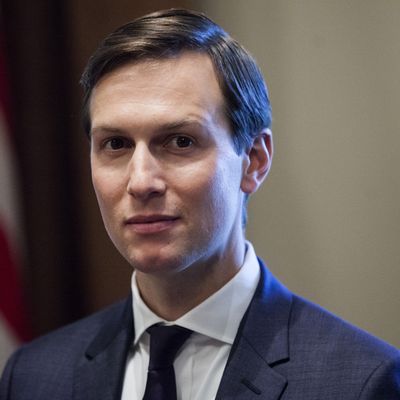
Many of the Trump presidency’s baleful aspects have little to do with the man himself. If NBC had offered the mogul a favorable contract to host a new season of The Apprentice in 2015 — and America had elected Jeb Bush, Marco Rubio, or Ted Cruz the following year — we still would have been saddled with a White House hell-bent on taking health care from the poor, giving tax breaks to the rich, and letting big banks and oil companies dictate regulatory policy.
And yet it’s safe to say that no other Republican president would have made Jeff Sessions his attorney general or massive resistance to criminal-justice reform a cornerstone of White House policy.
Before Donald Trump’s victory, mitigating mass incarceration was all the rage. Bipartisan support for sentencing reform was building in Congress, while the Obama administration was launching a variety of programs aimed at helping America’s prisoners reintegrate into society — including a federally overseen prison school system, funds for technology training, and anti-recidivism programs.
After Trump’s successful “law and order” campaign, congressional Republicans forgot about sentencing reform like it was just another sexual-assault allegation against the president — while Jeff Sessions went medieval on Obama’s prison reforms, slashing the budget for federal corrections, dismantling the school system, and laying off 6,000 prison staff.
But now, Jared Kushner is on the cusp bending the arc of justice back a couple inches on the latter front. For months, the son-in-law-in-chief has been trying to put together a package of prison reforms that Republicans and Democrats on the House Judiciary Committee would be eager to support — and that Sessions would be willing to tolerate. And according to Politico, he’s finally done so:
Lawmakers on the House Judiciary Committee are nearing agreement on a bipartisan prison reform bill that could be approved by the panel as soon as Wednesday and reach the floor in early May. The legislation, which would establish training programs aimed at reducing recidivism rates, is the product of months of negotiation between Reps. Doug Collins (R-Ga.), Hakeem Jeffries (D-N.Y.), President Donald Trump’s son-in-law and adviser Jared Kushner and Attorney General Jeff Sessions.
Sessions officially supports the effort, but his agency has done nothing to improve the bill’s prospects, and much to sabotage it: The Justice Department pushed to have concealed-carry language added to the bill that would have allowed judges to carry guns (or, more precisely, that would have allowed Jeff Sessions to frame anti-Second Amendment Democrats for the murder of prison reform).
But Jeffries and Collins agreed to scrap that poison pill. Their consensus legislation would expand access to education and vocational training in America’s prisons (although, it’s not clear if this “expansion” would still represent a net cut from the Obama years), while also providing well-behaved inmates with the opportunity to serve out the final years of their sentences in halfway houses, instead of prisons.
The bill enjoys the backing of the Koch network, and appears to have decent prospects in the House. But it might have trouble overcoming Chuck Grassley’s opposition in the Senate: The Senate Judiciary Committee chair is a champion of comprehensive criminal-justice reform, and has pledged to block half-measures like the one touted by Kushner. As the New York Times reported late last month:
Mr. Grassley said that he while appreciated Mr. Kushner’s desire to get something done, he did not support any effort to try to address prisons without fixing what he saw as fundamental unfairness in sentencing laws. And he believes Mr. Kushner shares his views. “But he sees a chance of getting half a loaf, and he’s willing to settle for a half a loaf,” Mr. Grassley said. “I’m not going to.”
For Kushner, prison reform is personal; his father did time for tax evasion, witness tampering, and campaign-finance violations. For Sessions, it’s ideological — despite the dearth of evidence that America’s aberrantly long prison sentences deter crime, or that making prison life more unpleasant reduces recidivism, the attorney general believes draconian criminal-justice policies are the key to public safety.
In an America with our current (low) crime rate — and a different Republican president — the concerns of the well-heeled sons and daughters of white-collar criminals would likely prevail over the sadism of “law-and-order conservatives.” But in this America, the safe money’s on the latter.






























